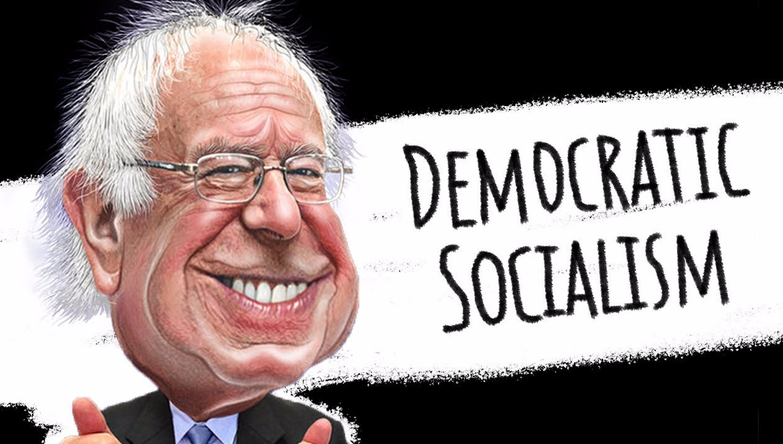CommentsPERSPECTIVE--And, in fact, Americans appear happy enough with a wide range of democratic socialist institutions in the United States, including public schools, public parks, minimum wage laws, Social Security, public radio, unemployment insurance, public universities, Medicare, public libraries, the U.S. postal service, public roads, and high taxes on the wealthy.
Even so, large numbers of Americans seem remarkably confused about democratic socialism. This April, at a CNN town hall in New Hampshire, an attendee complained to Senator Bernie Sanders, a leading proponent of democratic socialism, that her father’s family left the Soviet Union, “fleeing from some of the very socialist policies that you seem eager to implement in this country.” Sanders responded: “Is it your assumption that I supported or believe in authoritarian communism that existed in the Soviet Union? I don’t. I never have, and I opposed it.” He added: “What democratic socialism means to me is we expand Medicare, we provide educational opportunity to all Americans, we rebuild our crumbling infrastructure.”
But, despite Sanders’ personal popularity and the popularity of the programs he advocates, large numbers of Americans? Especially from older generations? Remain uneasy about “socialism.” Not surprisingly, Donald Trump and other rightwing Republicans have seized on this to brand the Democrats as the party of socialist dictatorship.
Why does socialism? Even something as innocuously labeled as democratic socialism? Have this stigma?
Originally, “socialism” was a vague term, encompassing a variety of different approaches to securing greater economic equality. These included Christian socialism, utopian socialism, Marxian socialism, syndicalism, evolutionary socialism, and revolutionary socialism. For a time, Socialist parties in many countries, including the Socialist Party of America, housed these differing tendencies.
But the 1917 Bolshevik Revolution led to a lasting division in the world socialist movement. The Bolsheviks, grim survivors of Russia’s centuries-old Czarist tyranny and vigorous proponents of socialist revolution, regarded the democratic, parliamentary path followed by the Socialist parties of other countries with scorn. Consequently, renaming themselves Communists, they established Communist parties in other lands and called upon “true revolutionaries” to join them. Many did so. As a result, the world socialist movement became divided between Socialist parties (championing multi-party elections and civil liberties) and rival Communist parties (championing violent revolution followed by a Communist Party dictatorship).
Despite the clear difference between Socialist parties (promoting democratic socialism, often termed social democracy) and Communist parties (promoting the authoritarian Soviet model and Soviet interests), plus the bitter hostility that often existed between them, many Americans associated one with the other.
This confusion was enhanced, in subsequent decades, by the tendency of Communists to cling to the term “socialist.” As “socialism” had positive connotations for many people around the world, Communist leaders frequently argued that Socialists weren’t “socialist” at all, and that Communists were the only true “socialists.” Communist-led nations alone, they claimed, represented “real socialism.”
Communist and Socialist parties didn’t have much in common. The Soviet government and later unelected Communist regimes? Much like fascist and other rightwing governments? Became notorious as brutal tyrannies that instituted mass imprisonment, torture, and murder. In reaction, many Communists grew disillusioned, quit their parties, or sought to reform them, while popular uprisings toppled Communist dictatorships. By contrast, Socialist parties won elections repeatedly and governed numerous nations where, less dramatically, they enacted democratic socialist programs. Nowhere did these programs lead to the destruction of political democracy.
Meanwhile, the Socialist Party of America gradually disintegrated. One reason for its decline was government repression during World War I and the postwar “Red Scare.” Another was that, in the 1930s, the Democratic Party adopted some of its platform (including a massive jobs program, Social Security, a wealth tax, union rights for workers, and minimum wage legislation) and absorbed most of its constituency. Rather than acknowledge the socialist roots of these popular policies, President Franklin Roosevelt and the Democrats chose to talk of a New Deal for “the common man.” This sleight of hand boosted the Democrats and further undermined the dwindling Socialist Party.
In response, conservatives? Especially big business, its wealthy owners, and their political defenders? Acted as if a Red revolution had arrived. Assailing Social Security, Republican Congressman Daniel Reed predicted that “the lash of the dictator will be felt.” In January 1936, at a gala dinner sponsored by the American Liberty League, a group of wealthy business and conservative leaders, Al Smith? The former New York Governor who had turned sharply against the Roosevelt administration. Addressed the gathering and a national radio audience. Charging that New Dealers had enacted “the Socialist platform,” he asserted that “there can be only one capital, Washington or Moscow. There can be only one atmosphere of government, the clear, pure, fresh air of free America, or the foul breath of communistic Russia.”
During America’s Cold War confrontation with the Soviet Union, conservatives frequently employed this line of attack. “If Medicare passes into law, the consequences will be dire beyond imagining,” Ronald Reagan warned a radio audience in the early 1960s. “You and I are going to spend our sunset years telling our children, and our children’s children, what it once was like in America when men were free.” Against this backdrop, most Democrats kept their distance from the word “socialism,” while much of the public simply wrote it off as meaning tanks in Moscow’s Red Square.
More recently, of course, the disappearance of the Soviet Union and most other Communist nations, rising economic inequality, the attractive model of Scandinavian democratic socialism, and Bernie Sanders’ Americanization of “socialism” have enhanced the popularity of “socialism”? In its democratic socialist form? In the United States.
It’s probably premature to predict that most Americans will finally recognize the democratic socialist nature of many programs they admire. But that’s certainly a possibility.
(Dr. Lawrence Wittner, is a CityWatch contributor syndicated by PeaceVoice. He is Professor of History emeritus at SUNY/Albany and the author of Confronting the Bomb (Stanford University Press).
-cw














